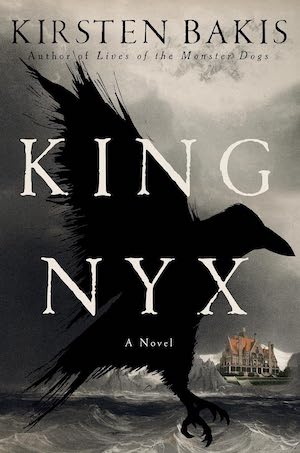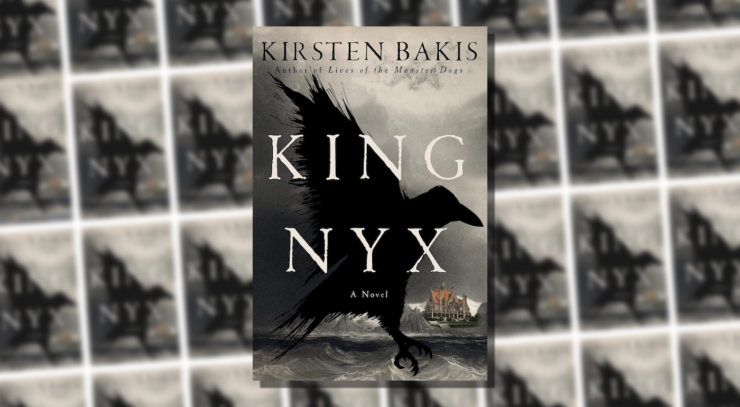Kirsten Bakis’ first novel Lives of the Monster Dogs was published in 1997 to critical acclaim, won numerous honours and is now considered a cult classic. It was a strange, beautiful story about a group of humanistic dogs created by cruel experimentation and design; a story that was both uncomfortable and haunting. 27 years later, Bakis returns with King Nyx, an equally gothic, though extremely different story about a woman dealing with repressed trauma, who is caught up in a strange set of mysterious coincidences on a remote island.
In her author’s note for King Nyx, Bakis writes of a biography of Charles Fort (the real life American writer who studied anomalous phenomena) by the novelist Theodore Dreiser, who visited Fort at his New York tenement slum, to find that Fort’s wife Anna basically held their home and him together. But for all her support, Dreiser was dismissive of Anna’s intelligence, writing that ‘this woman cannot think, she feels.’ It is Anna who inspired Bakis to write King Nyx, which she describes as a ‘dream of how it might be if lost girls were found, if the owner of a hand sore and chapped from laundry soap had time and space to hold a pen’.
This pen is Anna’s, and King Nyx is her account of a few strange days spent at the estate of Claude Arkel, a reclusive canned goods tycoon who offered patronage to Charles on his private island, where Charles can write his crypto-science book. Arkel is a man known for his peculiarities—his interest in automatons, his phobia of germs—but also for his immense wealth. He is as good a patron as a writer like Charles can dream of, given the strangeness of his own work.
When Anna and Charles reach Prosper Island, they find that it is also home to the Arkel School for Domestic Service, set up by the late Mrs. Arkel, who has died under strange circumstances. Eight girls, “the most promising that can be rescued from the New York penal system” are taken in by the Arkels and trained as domestic staff, though recently some have mysteriously vanished. They were “lost girls, in a way, before they arrived at the Arkel’s estate,” and now are shrouded in mystery.
Buy the Book


King Nyx
Anna and Charles are set up in a cabin alongside Frank and Stella Bixby, a psychologist who has treated Arkel in the past (ostensibly for nightmares) and his wife. Anna begins to notice a lot of strange things, both about their new companions and the island itself, including Frank’s dubious treatment methods, Stella’s odd disdain for her husband, and a young woman in the woods at night, who looks just like a friend Anna had twenty years ago. As Anna establishes a friendship with Stella, she is drawn into memories of the one she had let go of decades ago, and is disturbed by the uncanny feeling that she has a deeper connection with someone or something on the island.
As Anna’s thoughts of her friend start to bring other complicated memories to the surface, she takes us back to her youth, and to King Nyx, a totemic, powerful being who helped her navigate a rough childhood as a maternal substitute, a being who existed in her mind, based on a wind up toy she had as a child, a “… black tin bird with blue eyes that had once reigned over the pale, stiff dolls in the cigar box under [her] bed.”
King Nyx left her as an adult, when Anna learns to repress certain traumas and fearful memories, building up mental walls to keep herself safe and sane as per the directives of the men around her—her psychiatrist, her employer, her husband. Bakis dips into women’s rights at the time, and what was then considered revolutionary psychiatric care; it was, of course, the expected route for a woman at that time to swiftly recover from “hysteria” and carry on with her duties. Anna is often told that perhaps her inability to bear children is somehow the fault of her mental state, and though she may not agree, she does go along with it, as “when everyone is telling you one thing, it can be hard to see something different, even if it’s right in front of you. To do so means breaking with the people who make up your world, who keep you safe. It means walking outside the warm circle around the fire and into the dark unknown, the territory of the excluded.”
It is this territory of the excluded that Anna and Stella eventually venture into on the island, trespassing into darker, more frightening spaces—both physical and emotional. The narrative becomes a gothic murder mystery, thrilling with slow burn reveals, some of which aren’t the biggest of shocks, yet remain suspenseful. Each character’s traumas (past and present) weigh down on their realities, on their personalties and their relationships, and of course on their futures.
Bakis’ language throughout the novel is appropriately lush, moody and dark—perfectly gothic, endlessly readable. Shadows are everywhere in the novel, in spaces, in minds, in memories, “angled, jagged, cutting through [my] field of vision.” Anna feels “a vertiginous desire to step off the edge, fall into the cool, twinkling, life extinguishing darkness.” Figures “detach themselves from darkness,” something hangs from a tree, “skinless, shining wet and pink in the firelight.” There is plenty that is eerie, plenty that is heavily atmospheric and mysterious, but there is also a lot of solid background research that places the story firmly in history, be it of women’s place in society, 20th century developments in psychology or the suffrage movement.
King Nyx is a complex fever dream of a gothic narrative, a little bit Jane Eyre, a little bit Bluebeard, a little bit feminist historical fiction, a little bit remote location murder mystery, even a little bit steampunk—there is indeed a lot going on here, most of which flows together well. It’s well paced, easy to read and very, very easy to fall into. At times it may feel a little heavy-handed, such as when Bakis’ repeatedly drives home her point that Anna was a much greater intellect than she was historically known to be, or that that a lot of mansplaining existed at that time. Still, these are small matters in an otherwise well written and evocative narrative that creates tension around some pertinent questions about women’s identities being eclipsed by the mediocre but confident men around them. And in that, it is timeless.
King Nyx is published by Liveright.










